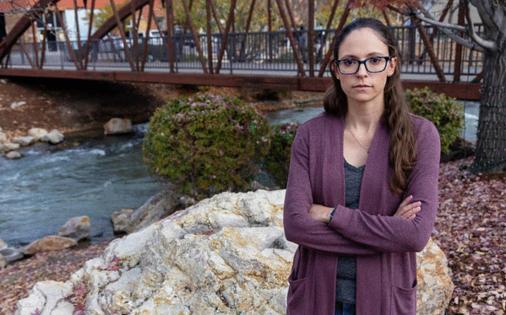Idaho abortion trial concludes after emotional testimony, controversial defense witnesses
Published in Political News
BOISE, Idaho — The Boise trial in a lawsuit challenging Idaho’s near-total abortion ban concluded Thursday after six days of tense proceedings and emotional testimony from women who said they were forced to leave the state for medical procedures.
The trial seeking clarity on health exceptions for abortions prompted tearful testimony from Idaho doctors and the four women who sued the state. And during the defense, the plaintiffs’ attorneys sparred with state lawyers over evidence they called anti-abortion “propaganda” and took aim at state witnesses. Idaho’s defense included an executive for an anti-abortion think tank and a physician who said during cross-examination that he considers hormonal birth control abortion.
Attorneys for the plaintiffs said they want to determine whether the exceptions apply for pregnant patients with medical conditions or complications that threaten their health, including future fertility; preexisting or underlying medical conditions that can’t be treated effectively during pregnancy; and patients with fatal fetal diagnoses.
The state argued that if the plaintiffs had their way, Idaho would have to add exceptions that would open the door for any condition to be considered justification for an abortion, even stepping on a rusty nail. Attorney James Craig said any risk of infection could be presented as a health-jeopardizing condition and used to justify an abortion.
Throughout the case, the state attorneys said the Idaho doctors and women who sought abortions out of state had no standing in the case, which they said was based on hypothetical situations rather than existing problems.
Fourth District Judge Jason Scott, who presides in Ada County, won’t make a decision in the case until early next year. Attorneys for the state rested their case late Thursday morning, and both parties agreed to take six weeks to review transcripts from the trial before submitting their final findings and conclusions.
Shortly before court concluded Thursday, Craig said the state intended to file another motion to dismiss the case.
Idaho lawyers, women offer testimony as state objects
The first days of the trial included emotional accounts from the women who said Idaho’s abortion ban forced them to leave the state to terminate wanted pregnancies after receiving diagnoses of fatal fetal conditions.
The women named in the lawsuit recounted their own stories of failed pregnancies that forced them to undergo abortion procedures out of state: Jennifer Adkins was at risk of developing life-threatening complications if she continued her pregnancy for a baby who would not survive. Jillaine St. Michel’s baby had severe anomalies that affected several different organs. Kayla Smith’s baby had numerous heart defects. And Rebecca Vincen-Brown’s baby had a rare genetic condition that typically results in a miscarriage of death soon after birth.
Tension quickly filled the courtroom as the state objected to the bulk of the women’s testimony. Craig said in his opening argument that the state acknowledges the women had “tragic pregnancies,” but argued they’re not seeking relief for those pregnancies since they are no longer pregnant.
Idaho doctors testified describing their confusion over the laws and what constitutes an abortion “necessary to prevent the death” of a patient. Physicians said they had delayed care for patients experiencing complications and referred them out of state.
Dr. Julie Lyons, a Blaine County family physician and one of the plaintiffs in the case, said one pregnant patient who came to the emergency room multiple times bleeding after her placenta separated from the uterine wall was “like a hot potato.” Lyons said doctors passed the patient around in the hopes of having a clear path forward before mentioning abortion as an option.
Two doctors at St. Luke’s Health System addressed how the laws prevent them from following national standards of medical care, and to the likelihood that their medical decisions could be second-guessed. Two out-of-state experts said the laws are unclear and confusing, and that they do not allow doctors to assist pregnant patients facing significantly harmful health conditions, either through fetal or maternal complications.
Idaho’s ban allows abortions if a doctor determines with “good faith medical judgment” that it will save a mother’s life.
“Who is going to decide that I didn’t use reasonable judgment?” said Dr. Katharine Wenstrom, the director of fetal medicine at a Rhode Island hospital and a professor at the Warren Alpert Medical School of Brown University. “Is it going to be someone with no medical training?”
She said she would never practice medicine in a state with an abortion ban like Idaho’s because the threat of criminal charges, loss of her medical license or lawsuits from family members of a fetus might affect her decision-making. Those consequences “would essentially end my career and ruin my life,” she told the court.
Liz Woodruff, executive director of the Idaho Academy of Family Physicians, which is also a plaintiff in the case, described “severe confusion” among the group’s 800 members across the state about how to interpret the abortion bans after Roe v. Wade, which guaranteed the constitutional right to abortion, was overturned in 2022.
She said the concerns prompted “urgent” pleas to lawmakers that they change the laws to add a health exception, and to make them more closely reflect medical terminology. Lawmakers have so far refused to make changes to the laws, and state health and legal officials have offered no guidance for physicians navigating pregnancy complications.
Asked why her organization had sued the state, Woodruff began to cry.
“We had done everything we could think of to try to resolve the concerns of our members and were otherwise unable to do so,” she said.
Idaho witnesses include doctor who claims birth control is abortion
After days of testimony and cross-examination of the plaintiffs’ witnesses, the state called its witnesses to the stand. Drs. Dustan Hughes, an OBGYN and founder of Lifestages medical practice in Nampa, and Rod Story, a family medicine doctor from Pullman, Washington, who owns a family medicine practice in Moscow.
The plaintiffs’ attorneys objected to including testimony from Hughes and Story, who were introduced as witnesses only at the beginning of the week. Craig said the state struggled to find doctors to testify because of their concerns about “professional repercussions.”
Hughes and Story in their testimony said they don’t find the laws confusing in their practice — though lawyers for the plaintiffs pointed out that Story does not manage regular OBGYN care for his pregnant patients.
Hughes, who has privileges at Saint Alphonsus Regional Medical Center in Nampa, said he tries to advise other physicians when they raise concerns about the legality of providing an abortion.
“I’ve been able to provide routine care, so it hasn’t affected my ability to treat these ladies at all,” Hughes said.
Hughes said during cross-examination that the state heard about him through his work with Lifeline Pregnancy Care Center, which offers pregnancy tests, ultrasounds and other pregnancy resources. Plaintiffs’ attorneys criticized the nonprofit as a “crisis pregnancy center,” which is an anti-abortion facility that tries to convince pregnant women not to pursue abortion.
Story also faced pushback from the plaintiffs’ attorneys, who questioned his overall stances on abortion. During cross-examination, Story said he considers an abortion any process that interrupts a fertilized egg — including hormonal birth control. Story said while the current medical abortion exceptions for molar and ectopic pregnancy align with his morals, he opposes Idaho’s exceptions for cases of rape and incest.
The state’s final witness was Dr. Ingrid Skop, a Texas OBGYN and vice president of medical affairs for the Charlotte Lozier Institute, a prominent anti-abortion think tank. Skop has provided controversial testimony on abortion in other states and was dubbed “the first call for anyone looking for an OBGYN to defend abortion restrictions” by the Texas Tribune after she was named to the state’s maternal mortality review committee earlier this year.
Skop, who is not licensed to practice medicine in Idaho, in testimony said Idaho’s ban is clear and allows doctors to provide patients with necessary care. Skop said abortion is frequently not medically necessary and can be physically and mentally harmful to women. She also described abortion as “feticide” and explained a “dilation and evacuation” abortion procedure using illustrations described by the plaintiffs’ legal team as “prejudicial and inflammatory.”
“The best word I can come up with is propaganda,” attorney Leah Godesky said.
Godesky proceeded to attack Skop’s credibility during cross examination and pointed to erroneous research Skop has published on abortion. Godesky asked Skop whether she had spoken to any Idaho physicians, pregnant Idaho residents, hospital administrators or county prosecutors before offering her opinion on practicing medicine under Idaho’s abortion bans.
Skop said she had not.
_____
©2024 The Idaho Statesman. Visit idahostatesman.com. Distributed by Tribune Content Agency, LLC.

































































Comments